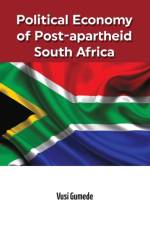av Vusi Gumede
1 429
South Africa held its first democratic elections in 1994, after about 350 years of minority governments. Nelson Mandela became the first President of a democratic or post-apartheid South Africa. The successive administrations since 1994 have pursued many programs, policies, legislative instruments and other initiatives to correct the imbalances that the apartheid system created. In particular, the focus, since 1994, has been on social and economic inclusion. Inclusive development is important for any democratic government emerging out of the past that was undemocratic and discriminatory. Redress becomes a hallmark of all that a democratic government pursues. The early years of a democratic or post-apartheid South Africa focused on national reconciliation. The second President, Thabo Mbeki, focused more on the economy a project he started when he was the first Deputy President in the Mandela administration. The third President of the democratic South Africa, Jacob Zuma, has continued with the project towards an inclusive society. In about twenty years since the dawn of democracy in South Africa the debates about the performance of the society under the leadership of the African National Congress (ANC) has gained momentum. The ANC came up with many discussion documents aimed at informing policy and or ideological orientation of the state. In its national Congresses and General Councils meetings as well as in Makgotla, the ANC discusses and develops policies and frameworks which are to influence the work of the government. The analysis of the policies pursued since 1994, especially as far as inclusive development is concerned, is critical and it is the main preoccupation of this book. In addition, the book also examines the effects and implications of the policies implemented since 1994, in the context of whether South Africa is becoming or not becoming a society that was envisaged by the liberation project; an inclusive and prosperous nation. South Africa is a complex society in many respects. Many of intractable dilemmas confronting South Africa are a result of the legacy of apartheid. Apartheid created a skewed distribution of resources and opportunities. It is therefore not surprising that many challenges that the successive democratic administrations have had to deal with are structural; the structure of the economy make it more challenging to reduce poverty and inequality as well as to create jobs for the majority of South Africans. The book analyses the ramifications of the apartheid system examining the totality of apartheid colonialism in relation to the post-apartheid development experience within the context of the global distribution of power. The fundamental challenge that constrains South Africa s ability to further achieve inclusive growth and development relates to policy. Therefore, economic policy has to address the challenges of unemployment and poverty, as well as reducing inequality. Social policy has to be robust. Labor market policies should be ameliorated. More importantly, social and economic policies have to work together for socioeconomic development. To achieve this, South Africa needs a new consensus on the ideal framework or approach to its socioeconomic development. Over and above policy and or policy reforms, implementation should be improved. In addition, and perhaps more importantly, South Africa needs to reconfigure state-capital relations. Lastly, it should be more meaningful and relevant in the context of democratic South Africa to see a nation as a community that acknowledges and respects its repulsive political and economic history of deprivation through systematic restitution, reconciliation, and restructuring measures, and, more importantly, equitable sharing of resources. This is an important book for collections in African studies and international politics.




